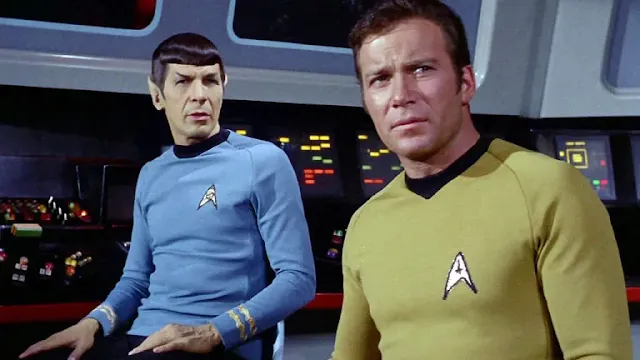The iconic statements made by Captain James T. Kirk and his crew, such as "beam me up, Scotty," and "live long and prosper," have found their way into everyday conversations, humor, and even advertising slogans.
"Logic
is the beginning of wisdom, not the end." - Spock (Episode:
"Star Trek VI: The Undiscovered Country", Season 6) Spoken by
Spock to highlight the importance of logic in decision-making and
problem-solving.
These quotes have become so ubiquitous that they are often used without people even realizing their origins. Star Trek's impact on the English language is a testament to its enduring popularity and the show's ability to capture the imagination of people across generations.
"Highly
illogical." - Spock (Various Episodes, Seasons 1-3) Spoken by Spock
when he encounters situations that don't make logical sense, which is a
recurring theme throughout the series.
"Live
long and prosper." - Spock (Episode: "Amok Time", Season 2)
This quote is the Vulcan greeting and farewell, spoken by Spock throughout
the series.
"Insufficient
facts always invite danger." - Spock (Episode: "Space Seed",
Season 1) Spoken by Spock to highlight the importance of gathering all the
necessary information before making decisions.
"Compassion:
that’s the one thing no machine ever had. Maybe it’s the one thing that
keeps men ahead of them." - Dr. McCoy (Episode: "The Ultimate
Computer", Season 2) Spoken by Dr. McCoy to highlight the unique
qualities of humanity that cannot be replicated by machines.
"We
make mistakes, but we're human - and maybe that's the word that best
explains us." - Captain James T. Kirk (Episode: "The Errand of
Mercy", Season 1) Spoken by Kirk to highlight the fallibility of
humanity, but also its unique qualities and potential for growth.
"Improve
a mechanical device and you may double productivity. But improve man, you
gain a thousandfold." - Khan Noonien Singh (Episode: "Space
Seed", Season 1) Spoken by Khan, a genetically-engineered superhuman,
to highlight the potential for human evolution and improvement.
"I
canna change the laws of physics." - Montgomery "Scotty"
Scott (Various Episodes, Seasons 1-3) Spoken by Scotty when he is unable
to perform a seemingly impossible task due to the limitations of
technology.
"One
man cannot summon the future." - Spock (Episode: "Requiem for
Methuselah", Season 3) Spoken by Spock to highlight the limitations
of individual action and the importance of collective effort.
“To
boldly go where no man has gone before.” – Captain James T. Kirk, opening
narration of Star Trek: The Original Series Context: This iconic quote
from the opening narration of Star Trek: The Original Series captures the
essence of the show's exploration and adventure themes, as the crew of the
Enterprise sets out to explore new worlds and encounter new civilizations.
"But
one man can change the present!" - Kirk (Episode: "The City on
the Edge of Forever", Season 1) Spoken by Kirk to highlight the
potential for individual action to create positive change in the world.
“Without freedom of choice there is no creativity.” – Captain
James T. Kirk, "The Return of the Archons," Season 1, Episode 21
Context: In this episode, the Enterprise crew visits a planet that is
controlled by a computer called "Landru" that has eradicated all
individuality and freedom of choice in its population. This quote by
Captain Kirk highlights the importance of freedom of choice and
individuality in creativity and innovation.















